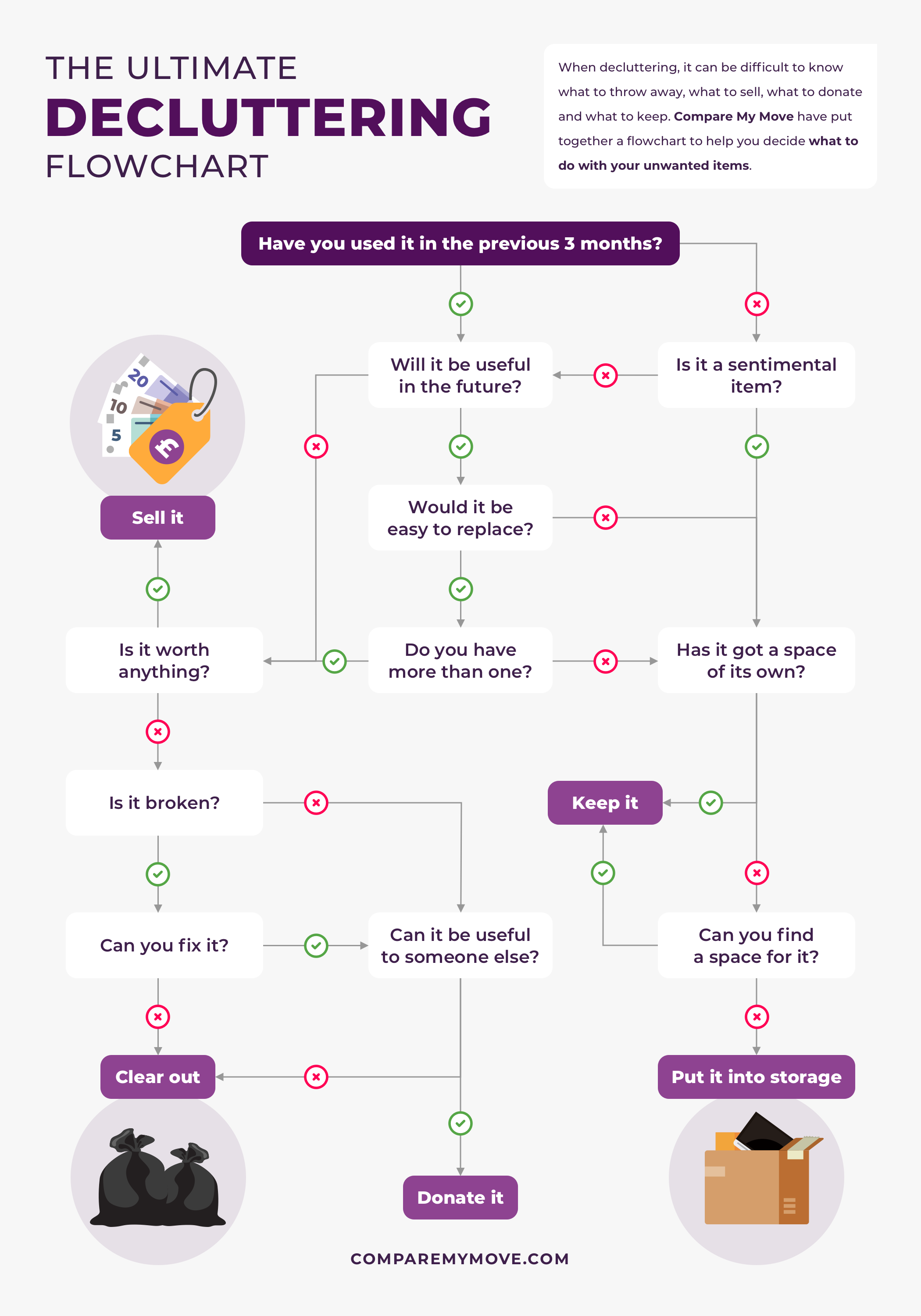How to Declutter For a House Move
Most people allow clutter to build up simply because they have no idea where to start. Decluttering your home is, in theory, a simple and highly rewarding task. But it’s important that you stick to a method and work at your own pace to ensure a more efficient and stress-free process.
A study shows that 1 in 2 people admit to holding onto household items for longer than they should. That’s 54% of the UK with increasingly cluttered homes. By decluttering before a house move, you will be saving yourself a lot of time and money during the packing process as fewer items mean fewer moving boxes.
Compare My Move works with a variety of property experts to help you through the moving process. In this article, we’ve compiled a few of our favourite methods to help you declutter your home before moving house to ensure an easier packing process. Read on to find out how decluttering will save you money and hassle on your house removals.

Share this Image On Your Site
<a href='https://www.comparemymove.com/advice/removals/other/how-to-declutter'><img src='https://www.comparemymove.com/assets/img/uploads/Flowchart-1.png' alt='The Ultimate Decluttering Flowchart ' width='2100' /></a></p>
Why Should You Declutter Before Moving House?
Decluttering can be a highly therapeutic exercise, so you won’t be surprised to hear that it’s scientifically proven to improve your happiness. An organised home signals an organised life and mind. Not only is it more aesthetically pleasing, but a clutter-free home can actually help you sleep better. When you declutter before moving house, you are very much “starting as you mean to go on”, freeing yourself of unwanted items and moving on, in every sense.
Although decluttering is, ideally, a constant, ongoing process, you’ll most likely find that moving house requires a concerted decluttering effort. Decluttering before moving will save you money on your home removal costs, as the removal team will be packing up fewer unnecessary items. It's a useful tip to consider when it comes to packing when moving home.
Don’t forget, if you declutter after you’ve been received your removal quote, then do let the removal company know to see if they can adjust the quote. For more information on what you should do before moving house, check out our moving house checklist.
Why is Decluttering So Difficult?
1 in 3 Brits admit they don't like getting rid of items, so it’s no surprise that we find decluttering such a difficult task. There are a plethora of reasons why we put off decluttering our homes, such as thinking we don’t have enough time, feeling unsure where to start or even being too sentimental about our possessions.
We waste 3,680 hours of our lives looking for lost items such as keys, mobile phones and wallets. Declutter and you could start to earn back some of these precious lost hours.
Popular Decluttering Methods
These are some of the most popular methods to try if you want to declutter.
1. Marie Kondo
Marie Kondo is a Japanese organizing consultant and author whose decluttering methodology, KonMari, has become an international phenomenon. One of Kondo’s most recognisable decluttering methods is to ask yourself “does this item spark joy?” If the answer is no, then you treat the item with respect and send it on its way to a new life. She suggests you start to declutter your home by targeting categories and not room by room, starting with the easiest items such as clothes or books, and leaving photographs or nostalgic items until last.
2. Swedish Death Cleaning
This decluttering craze is based on a book by Margareta Magnusson, ‘The Gentle Art of Swedish Death Cleaning: How to Free Yourself and Your Family from a Lifetime of Clutter’. The idea is that you declutter your house to save your friends and family having to go through all your personal belongings after you die. This is a great method to declutter your home and life.
3. Project 333
Project 333 is the minimalist fashion challenge that invites you to choose only 33 items of clothing and accessories for 3 months. However, this method is an extremely useful way to declutter your home also. Every 3 months pick 33 items you no longer wear, use or have never used and decide how to get rid of them. If you’d rather do this gradually, you can choose a few items a day to sell or donate, slowly decluttering your home as you go. You can also generate a little extra revenue for yourself, by selling unwanted clothes through apps like Depop, or websites such as eBay or Gumtree.
4. The Minimalists 90/90 Rule
Joshua Fields Millburn and Ryan Nicodemus, A.K.A. The Minimalists, have created the 90/90 rule to tackle the task of decluttering. If you haven’t used the item in the last 90 days and don’t plan on using it in the next 90 days, then get rid of it. Living with a minimalist mindset is a current trend in home décor and wider lifestyle circles, so you can use this as motivation to declutter your home too.
Tips for Decluttering Before Moving House
Now that you’re familiar with a few weird and wonderful decluttering methods, here are our top tips on completing the task at hand.
1. Be Ruthless
Before you even attempt to start decluttering your house, you need to make sure you’re in the right mindset. You need to be completely ruthless when sorting through your personal belongings.
We spoke to Helen Sanderson, Space Therapist, decluttering expert and creator of the Home Declutter Kit, who gave her methodology behind decluttering.
“Start with letting go of the things you no longer need as they will be holding you back and blocking the flow in your life. Remember, the less you have, the less you have to manage and the more time you'll have to enjoy your new home and this next chapter of your life. Declutter your home to create room for your future. Take the opportunity of moving house to make a fresh start in life.”
2. Start Early to Save on Costs
It’s vital you start to declutter early when you’re moving house. This allows you to provide your removal company with an accurate estimation of how many boxes they’re going to be moving. This means that the earlier you start, the more money you could save on removal costs.
3. Use eBay
An easy way to declutter your house is to first gather everything that you can sell. Start by looking for clothes that no longer fit or you never wear, electrical devices that are gathering dust or that list of unwanted Christmas presents. Knowing that you can make a little extra cash from decluttering makes the process significantly more worthwhile.
It’s useful to label 3 boxes ‘charity’ ‘sell’ and ‘tip/dump’ and if you come across something you never use during your daily activity, choose which box it belongs in. eBay, Depop and Gumtree are all easy ways to earn some cash as well as decluttering.
4. Try the 30 Day De-Clutter Challenge
The 30 Day De-Clutter Challenge is designed to tackle a small, manageable chunk of decluttering each day for a month. You can sign up for free and get the tasks emailed to you each day. If you’d rather, you can create your own specific tasks each day.
5. Leave Sentimental Items for the End
It's much easier to declutter items you have no attachment to. To help you begin, get rid of the items that do not have sentimental value, leave the more difficult decisions for last. This should ensure a less frustrating and stressful process.
6. Check Expiration Dates
When cleaning food, bathroom products or even makeup, it's worth checking the expiration dates to help you decide which items should go. While using some expired products won't harm you, it can greatly help you be more ruthless and determine which items you don't need to take with you.
7. Create an Essentials Box
When moving house, you will need a box of essential items to ensure you have everything you need during your first night in the new property. This box could include snacks, phone chargers, toiletries, DIY tools, anything you think could be vital during your first night. Mark this box once it's full to ensure it doesn't get loaded onto the removal van without your permission - if possible, it would be wise to keep this box near you during the move.
8. Organise Junk Removals
Now you've decluttered, it's time to organise your junk removal. It's important to do the research and avoid overpaying for the job with a 'cowboy' company. You should only use a licensed waste collector so you know you're in good hands.
Your Room by Room Declutter Checklist
Step 1 - Attic/Garage
The attic and garage are usually where most of us dump things we use once a year, like Christmas decorations. It’s likely these places will hold clutter that’s easy to get rid of. This is a good starting place.
Here are a few rules you can follow:
- Get rid of anything that you’ve not used or looked at in the last year
- Ask yourself why items are in the garage and not in the house – do you really want them?
- Keep your floor space clear by putting up shelves
- Don’t store anything here that could be affected by extreme weather
Step 2 – Bedroom
This is another easy starting point as most of us only use 20% of the contents of our wardrobes.
Here’s how we recommend you go about the bedroom clear-out:
- Start by sorting through your clothes. If you can’t remember wearing an item, and can’t think when you’ll wear it next, discard it. You can donate clothes to a charity shop, or list them on eBay or Depop.
- Get rid of expired or empty bottles of make up and body lotion
- Only keep essentials on your bedside table and dressing table
- Get rid of any old receipts, train tickets or other paper that you no longer require
Step 3 - Living Room
We spend a lot of time in our living rooms so there’s a fair chance you’ve let unwanted items build up here too. Really though, this is where you want to be relaxing, so it makes sense to keep this room nice and clear.
Here are the easy places to start:
- Get rid of old TV remotes and unused wires
- Recycle any old newspapers and magazines that you no longer need
- Donate unwanted books, CDs and DVDs to your local charity shop
- Organise photographs – these could be stored in your newly decluttered attic, or on a bookshelf if they’re in an album
Step 4 – Bathroom
Lots of us are guilty of storing a heap of expired and unused toiletries in the bathroom.
Here are some quick tips for minimising your bathrooms clutter:
- When you move, you’ll ideally want to reduce bathroom storage down to 1 or 2 boxes
- You only need 1 shampoo, conditioner and shower gel/soap open at a time – if you have unopened spares, tuck these away out of site, and if you have multiple open bottles, combine where possible.
- Chuck away all expired, mouldy or empty bottles
- Donate or get rid of unused towels, and discard any old or stained ones you no longer use
Step 5 – Kitchen
We spend most of our time in our kitchens, using many of the items there on a daily basis. This doesn’t mean there isn’t junk hiding there though, so you’ll need to dedicate some time to decluttering your kitchen too.
Our top tips for decluttering a kitchen:
- Get rid of expired food including jars and bottles of sauces, as well as any old cupboard stock
- Recycle contents of the drawer that’s usually filled with take away menus/receipts/broken lighters
- Donate any unwanted cups, mugs, plates and crockery to your local charity shop, or list the items on a site like Freecycle or Gumtree
Using Self-Storage For Extra Space
Decluttering items can be a daunting task, especially if there's a tight deadline. Self-storage units can be a very beneficial solution to cleaning and decluttering before moving house.
If there's excess furniture, sentimental items or you simply just need more time to go through everything, self-storage units provide you with extra space to protect your possessions until you're ready to go through them. This will reduce the number of boxes you need to be moved on the big day, ensuring a more organised and efficient removal. Once the process is complete, you will then have all the time you need to unpack and go through the remaining items stored away.
Some removal companies provide self-storage services or you could compare storage facilities online. Storage costs will vary depending on the size of the unit required as well as the location and whether you require additional shelving. However, we discovered that the average storage costs in the UK are £23.94 per square foot, according to the Self Storage Association UK.
Save on Moving House Costs
Once your home is clutter-free and ready to move, fill out our quick and simple form and we’ll connect you with up to 6 professional home removal companies. We can help save you up to 70% off your home removal costs.

